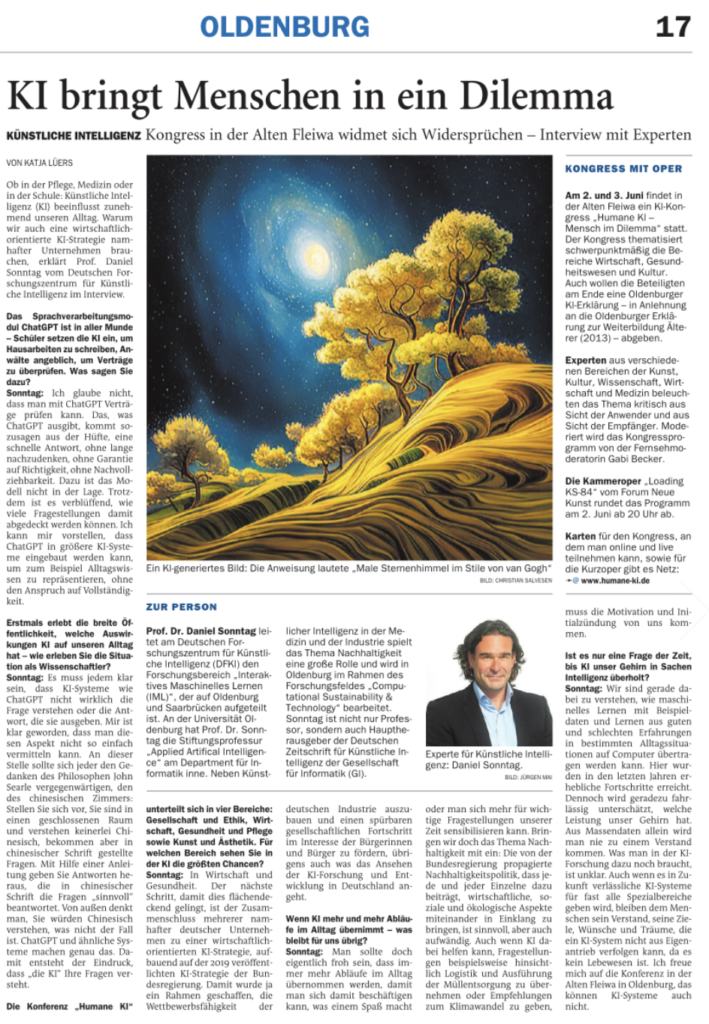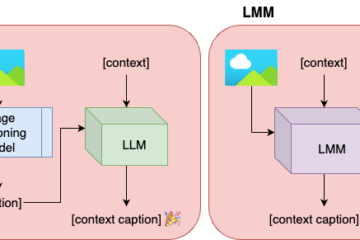Humans face dilemma because of AI
ARTIFICIAL INTELLIGENCE – Congress in Alte Fleiwa in Oldenburg addresses contradictions – Interview with an expert
Whether in care, medicine or schools, artificial intelligence (AI) is increasingly influencing our everyday lives. In this interview, Prof. Daniel Sonntag from the German Research Center for Artificial Intelligence explains why we also need a business-oriented AI strategy from well-known companies.
Question: Everyone is talking about the language processing module ChatGPT – students are using AI to write homework, lawyers are supposedly using it to check contracts. What are your thoughts on this?
Sonntag: I do not believe that ChatGPT can be used to check contracts. For its output, ChatGPT shoots from the hip, so to speak, quick answers without much thought, without any guarantee of correctness, without traceability. The model is not capable of that. Nevertheless, it is amazing how many issues can be covered with it. I can imagine that ChatGPT can be integrated into larger AI systems to represent everyday knowledge, for example, without any claim to completeness.
Question: For the first time, the general public is experiencing the impact of AI on our everyday lives – how do you see this situation as a scientist?
Sonntag: It must be clear to everyone that AI systems like ChatGPT do not really understand the question or the answer they give. I have realized that it is not easy to convey this aspect. At this point, everyone should bring to mind the philosopher John Searle’s thought experiment of the Chinese room: Imagine you are in a closed room and do not understand any Chinese, but are asked questions written in Chinese characters. With the help of a manual, you give answers that “make sense” in Chinese writing. On the face of it, it seems as if you would understand Chinese, which is not the case. ChatGPT and similar systems do exactly that. This gives the impression that “the AI” understands your questions.
Question: The conference “Humane KI” is divided into four areas: Society and Ethics, Economy, Health and Care, and Art and Aesthetics. In which area do you see the greatest opportunities in AI?
Sonntag: In economy and health. The next step to ensure a comprehensive success in these fields is the merging of several well-known German companies for an economically oriented AI strategy, building on the German government’s AI strategy published in 2019. This has created a framework for expanding the competitiveness of German industry and promoting noticeable social progress on behalf of the citizens, incidentally also concerning the reputation of AI research and development in Germany.
Question: If AI takes over more and more processes in everyday life – what remains for us?
Sonntag: We should actually be happy that more and more everyday processes are being taken over so that we can do what we enjoy or become more aware of the important issues of our time. Let us address the topic of sustainability: The sustainability policy propagated by the German government that each individual person contributes to reconciling economic, social and ecological aspects makes sense but is also complex. Even if AI can help to address issues such as logistics and waste disposal or make recommendations on climate change, the motivation and initial impulse must come from us.
Question: Is it only a matter of time before AI overtakes our brains in terms of intelligence?
Sonntag: We are currently in the process of understanding how machine learning with sample data and learning from good and bad experiences in certain everyday situations can be transferred to computers. Considerable progress has been made in this area in recent years. Nevertheless, the power of our brain is downright negligently underestimated. Mass data alone will never lead to a mind. It is unclear what is needed in AI research for achieving this. Even if there will be reliable AI systems for almost all special areas in the future, humans will still have their minds, goals, wishes and dreams, which an AI system cannot pursue on its own initiative because it is not a living being. I am looking forward to the conference in the Alte Fleiwa in Oldenburg, which AI systems also cannot do.
Interview by Katja Lüers

Original article in German


